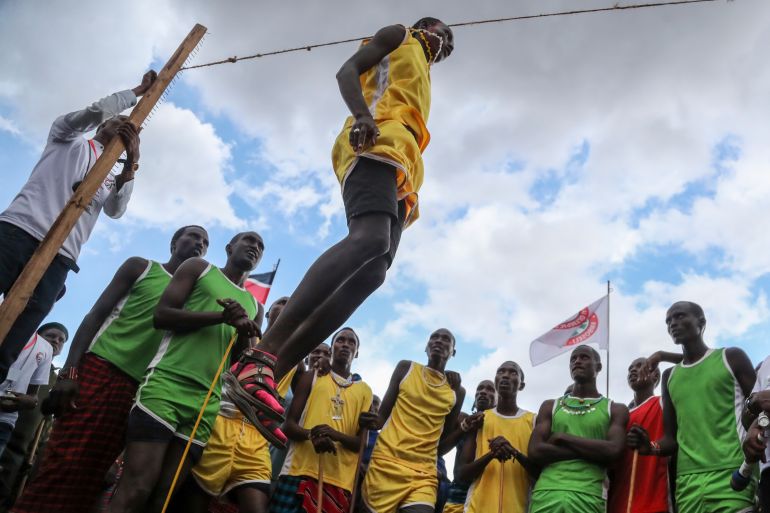At Kenya’s Maasai Olympics, warriors swap lion hunt for high jump
The number of lions in Kenya has plummeted from about 30,000 in the 1970s to little more than 2,000 today.

Dozens of Maasai youths in Kenya have taken part in the fifth edition of the “Maasai Olympics”, a sporting event promoted by conservationists as an alternative to lion killing as a rite of passage for young warriors.
The games, which included spear throwing, athletics and high jump, were held on Saturday in Kimana Sanctuary on the foothills of Mount Kilimanjaro, near Kenya’s border with Tanzania.
Recommended Stories
list of 4 items- list 1 of 4Killing of Pakistani journalist in Kenya ‘planned’: Report
- list 2 of 4Kenya’s Ruto suspends officials who disputed August poll victory
- list 3 of 4Kenya faces threat of athletics ban amid doping crisis
- list 4 of 4Al-Shabab gunman kills three Kenyan peacekeepers in Somalia
The competition drew some 160 morans or warriors, including 40 women, some of whom were draped in colourful sporting beads.
First held in 2012, the games were created by Maasai leaders and the Big Life Foundation to replace the community’s “Olamayio” rite, which required boys to fight and kill a lion to prove their bravery and manhood.
The move was in response to a rapid decline in Kenya’s lion population, which has plummeted from an estimated 30,000 in the late 1970s to little more than 2,000 today. The Kenya Wildlife Service says the biggest threat to lions and other carnivores is conflict with humans.
“We now co-exist perfectly with the wildlife,” Maasai leader Matasia Nerangas said.
“We share the same grazing fields and watering holes with the wild animals, and we stand to benefit more now than before.”

Craig Millar, chief operating officer of Big Life Foundation, said the games had helped reduce danger to the lion population in the area.
“[The] programme has had a huge impact on the lion population and it is one of the few areas in Africa outside of protected areas where lion population is stable or growing,” he said.
Saturday’s games included sprints of distances ranging from 100 metres to 5,000 metres (328-16,404 fee), and throwing events in which participants used the traditional wooden clubs, known as “rungus” and used to ward off hyenas, instead of discuses.
In the revised high jump event, participants leapt into the air to try and touch a rope with the top of their head, like the Adumu dance performed at ceremonies.
The winners of the various events were rewarded with medals and cash prizes.
The games are a “good way to preserve our lands,” said 30-year-old Joseph Lekatoo, who has been competing since 2012.
“Now, I am hunting the medals, I am not hunting lions,” said Lekatoo, who won the javelin throw.
Elder Maasai men have also praised the games.
“I killed two lions when I was young,” 66-year-old herder Lenkai ole Ngola told the AFP news agency.
“But today, it is important to protect them, because their numbers are declining and also because they provide jobs for young people,” he said, referring to tourism.